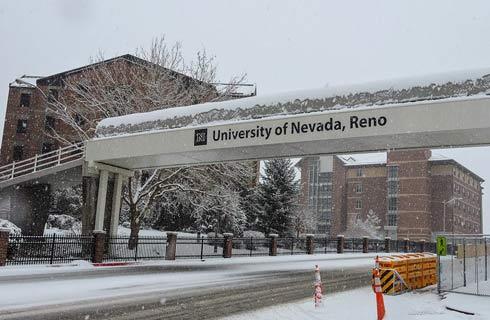Bachelor of Science in Environmental Science (Pollution and Environmental Contaminants)

学历文凭
Bachelor Degree

专业院系
环境科学

开学时间

课程时长

课程学费

国际学生入学条件
To be admitted to an undergraduate degree program as a regular freshman student, you must be a graduate from an approved or accredited high school (GED certificate may not be used for admission) and satisfy the below requirements:
You must have a 3.0 weighted GPA in the academic core courses in order to be admitted to the University of Nevada, Reno. The academic courses include: English, math, social sciences and natural sciences. A weighted GPA takes into account the extra difficulty of honors, AP or IB classes.
You must submit your final, official high school transcripts to support your application for admission.
SAT/ACT scores: We do not require SAT or ACT scores for admission or scholarship consideration
IELTS (must be academic version) with a score of 6.0 plus
TOEFL score 61 plus
IDP—雅思考试联合主办方

雅思考试总分
6.0
了解更多
- 雅思总分:6
- 托福网考总分:61
- 托福笔试总分:160
- 其他语言考试:Duolingo- 95
CRICOS代码:
申请截止日期:请 与IDP联系 以获取详细信息。
课程简介
Environmental pollution is a local, regional, and global problem that continues to grow as increasing human population growth and resource consumption exert more pressure on the environment. The Pollution and Environmental Contaminants specialization emphasizes the transport and fate of pollutants, as well as their effects on organisms. The coursework focuses on characterization of environmental organic and inorganic pollutants including Hg, pesticides, toxic trace metals, and emerging contaminants such as antibiotics and other pharmaceuticals. In addition, coursework addresses how pollutants move between air, water, soils, and biota. Finally, students will take coursework addressing the human and animal health impacts of environmental contaminants. The specialization provides students with a solid background in chemistry and physics that will prepare students for a wide range of employment opportunities. Upon graduating, students are well positioned to pursue graduate studies or to enter employment with state and federal agencies (Nevada Division of Environmental Protection, U.S. Environmental Protection Agency, U. S. Natural Resources Conservation Service), private consulting firms, and non-profit organizations.<br>Students will be able to:<br>demonstrate critical thinking skills by assessing a problem, gathering and analyzing relevant information associated with that problem, and proposing possible solutions. demonstrate effective oral and written communication skills. demonstrate technical competency within their respective discipline.
相关申请

预科

奖学金

实习机会

在校学习

跨境学习

校园授课-线上开始

在线/远程学习
本校相关课程
Master of Music in Music Education

学历文凭
Masters Degree
下一个开始日期
课程费用总额
Master of Arts in Music

学历文凭
Masters Degree
下一个开始日期
课程费用总额
Bachelor of Arts in Women's Studies

学历文凭
Bachelor Degree
下一个开始日期
课程费用总额
Bachelor of Science in Wildlife Ecology and Conservation

学历文凭
Bachelor Degree
下一个开始日期
课程费用总额
Bachelor of Science in Veterinary Science

学历文凭
Bachelor Degree
下一个开始日期
课程费用总额
Doctor of Philosophy in Speech Pathology

学历文凭
Ph.D.
下一个开始日期
课程费用总额
其他相关课程
环境科学理学学士

罗格斯新泽西州立大学纽瓦克分校
泰晤士高等教育世界大学排名:

学历文凭
Bachelor Degree
下一个开始日期
课程费用总额
Master of Arts in Marine Affairs - Climate Adaptation and Resilience

罗德岛大学
泰晤士高等教育世界大学排名:976

学历文凭
Masters Degree
下一个开始日期
课程费用总额
Bachelor of Science in Design and Environmental Analysis

康奈尔大学
泰晤士高等教育世界大学排名:18

学历文凭
Bachelor Degree
下一个开始日期
课程费用总额
Bachelor of Arts (BA) Degree with a Major in Earth, Environmental, and Planetary Sciences

莱斯大学
泰晤士高等教育世界大学排名:103

学历文凭
Bachelor Degree
下一个开始日期
课程费用总额
Master of Science in Environmental Science (Chattanooga Campus)

田纳西大学
泰晤士高等教育世界大学排名:

学历文凭
Masters Degree
下一个开始日期
课程费用总额





